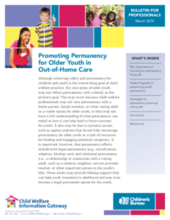Demographic Data
|
Sources: World Bank, UNICEF, UNDP HDR 2015, DHS 2014 |
Displaying 6481 - 6490 of 14424
This study explores the qualitative responses of child welfare workers in Florida to understand their collaboration experiences, focusing specifically on their perceptions of facilitative factors of collaboration with Intimate partner violence (IPV) services.
"Twenty-nine parents from across Central America who were separated from their children by U.S. immigration agents last year crossed the U.S. border on Saturday, demanding asylum hearings that might allow them to reunite with their children," according to this article from the Washington Post.
This bulletin provides information for child welfare professionals about the importance of permanency for youth and strategies for achieving it. Permanency efforts for youth should include both legal permanency (e.g., reunification, adoption, kinship care) and relational permanency (i.e., a relationship or connection with a caring adult, such as a relative, neighbor, service provider, teacher, or other important person in the youth's life). These adults may provide lifelong support that can help youth transition to adulthood and may even become a legal permanent option for the youth.
Language That Cares is a collaborative effort led by TACT that aims to change the language of the care system. Language is a powerful tool for communication but sometimes the way that it is used in social care creates stigma and barriers for understanding. Language is power, and we want children and young people to feel empowered in their care experience.
This report represents the successful integration of multidimensional child poverty measures in national statistics. In doing so it provides a better understanding of child poverty in Uganda by augmenting Uganda’s rich tradition of poverty analysis with a more deprivation-centred analytical tool.
The purpose of this manual is to provide guidance on how to collect and report data on children in formal alternative care in Ghana in a standardised way, and to analyse, present, and make the data available for use.
El objetivo de este documento es identificar y transmitir las características del método que ha empleado RELAF para generar la adecuación de los subsistemas de protección integral de derechos de los niños privados de cuidados familiares o en riesgo de perderlos, haciendo énfasis en procesos de desinstitucionalización.
This chapter’s authors argue that social policy on leaving care is a critical resilience process for promoting care leavers’ successful transition toward emerging adulthood.
This report presents the findings of a global survey designed to map current implementation of Inclusive Early Childhood Development (IECD) and Early Childhood Intervention (ECI) programs, among other objectives, and outlines recommendations based on those findings.
This article is based on the author’s keynote presentation given at the Irish Foster Care Association (IFCA) conference in November 2018. It outlines an ‘ecological’ model for promoting foster care stability in Ireland.






